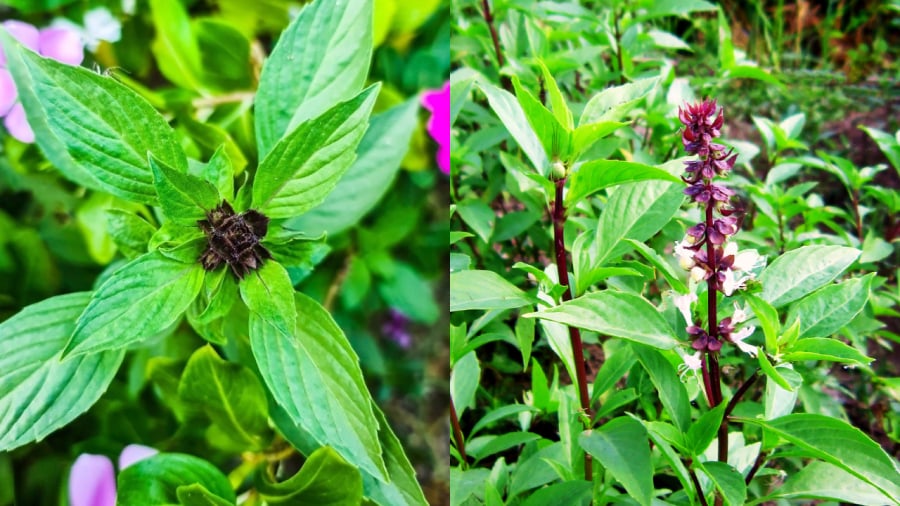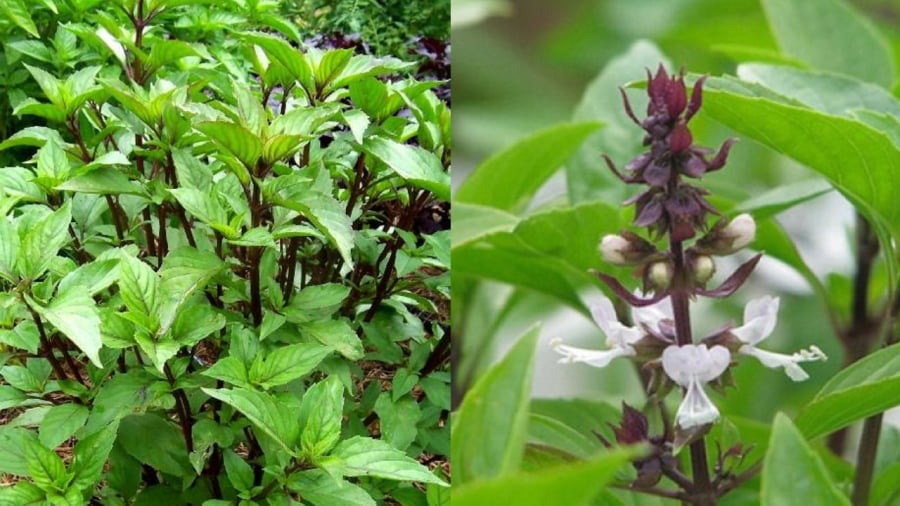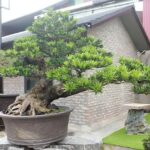Health Benefits of Basil
Basil, also known as Thai basil, is a popular herb in Vietnam. It is characterized by its high content of essential oils, giving it a distinct aromatic fragrance.
Basil is rich in beta-carotene, which protects epithelial cells from free radicals and helps prevent inflammatory conditions such as arthritis. Additionally, its high magnesium content promotes blood vessel and muscle relaxation, improving blood flow and regulating heart rhythm.
This herb is also an excellent source of iron, calcium, potassium, vitamins C and K, and dietary fiber, making it beneficial for digestive health.
Feng Shui Significance of Basil
In Feng Shui, basil is believed to attract wealth and prosperity, bringing good fortune to its growers. Therefore, planting basil around or inside the house is considered auspicious.
The optimal directions for planting basil are North, East, or Northeast, according to Feng Shui principles. Planting in these directions is thought to attract positive energy and financial blessings while dispelling negative influences.

Growing basil in your garden or on your balcony not only provides a convenient source of flavor but also brings good Feng Shui.
Growth Characteristics of Basil
Basil is an annual herb that can grow up to 40-50 cm in height, depending on soil quality and cultivation methods. It produces small white or purple flowers that grow in single or branched clusters.
Basil thrives in hot and sunny conditions, with an ideal temperature range of 25-35°C. When temperatures drop, its growth slows, and it may wither.
As a sun-loving plant, basil requires ample sunlight to flourish.
How to Grow Basil
– Soil Requirements for Basil
Basil prefers well-drained, sandy soil rich in organic matter. When planting in a garden, choose a sunny spot with elevated land, or create raised beds. If using pots or containers, ensure they have adequate drainage holes to prevent waterlogging. It is beneficial to apply a basal dressing of manure before planting.
– Propagating Basil from Seeds or Cuttings
You can easily grow basil from seeds, which are available at gardening stores, flower markets, supermarkets, and online retailers.
Sow the seeds approximately 0.5 cm deep and 20 cm apart to provide sufficient space for root development. Cover them lightly with straw or husks, and keep the soil moist. Within 15-20 days, the seedlings should reach a height of 10-12 cm with 5-6 true leaves.
Alternatively, you can propagate basil through stem cuttings. Remove most of the leaves from the lower part of a basil stem, then insert the cutting into the soil, firming it in place, and water it regularly.

You can grow basil from seeds or propagate it through stem cuttings.
– Caring for Your Basil Plant
Basil thrives in sunny locations and moist conditions. During the initial stages of seed germination or stem cutting propagation, especially in hot and sunny weather, consider covering the soil surface with leaves, straw, or a net to retain moisture.
Maintain a consistent watering schedule, adjusting the amount of water according to the plant’s needs and soil moisture levels.
To prevent premature flowering, pinch out the growing tips when the plant has produced 10-15 leaves. This encourages the growth of side shoots and more leaves. If flowers do appear, remove them promptly to prevent the leaves from wilting.
You can start harvesting the leaves when the plant reaches a height of 15-20 cm. Regular harvesting encourages the production of new, tender leaves. If cold weather is approaching, harvest the leaves early to avoid the plant drying out due to low temperatures.
Fresh basil can be stored in the refrigerator, wrapped in paper, for later use.
Allow a few plants to flower and set seeds before winter arrives. Collect and retain these seeds for future plantings.
The Magic Trio: Plant These 3 Trees to Invite Prosperity and Improve Your Luck
For centuries, our ancestors have passed down a wealth of knowledge and beliefs about Feng Shui, including the concept of planting ornamental plants in front of our homes. Among these beliefs, three particular types of plants are thought to bring not just wealth and luck but also prosperity and flourishing growth to the household.
Should You Expose Your Pothos to Direct Sunlight? The Answer May Surprise You!
Although I possess a green thumb and a wealth of experience in horticulture, I cannot claim to provide definitive answers to all queries. The realm of nature is ever-changing and full of mysteries, and my knowledge, though extensive, has its limitations. However, I am committed to sharing my expertise and guiding you through the fascinating world of plants and their care. Join me on this journey, and together, we shall explore the beauty and wonders of nature, cultivating not only plants but also a deeper understanding and appreciation for the magic that surrounds us.


































